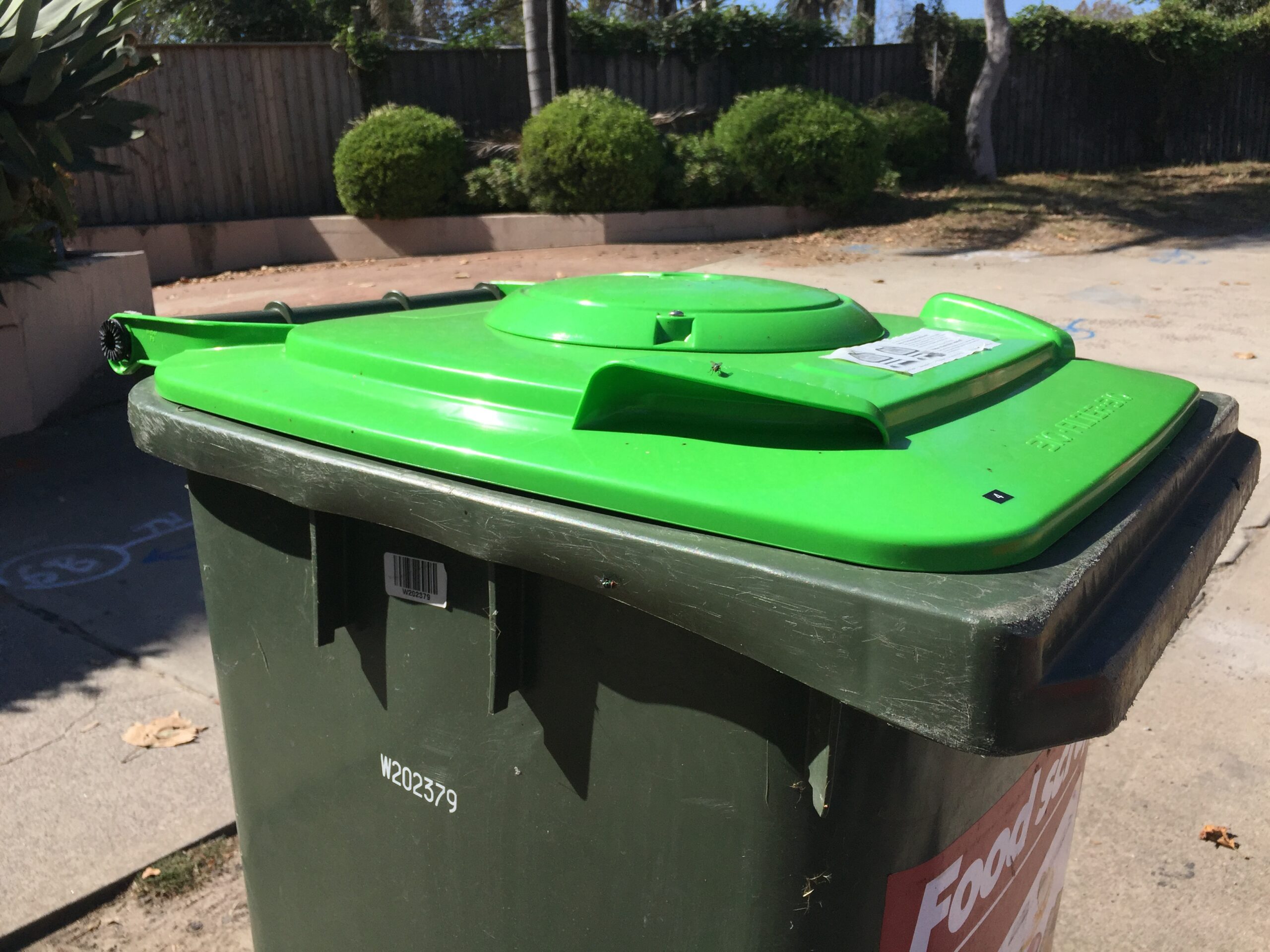Mastering FOGO Waste Management: Tailored Strategies for Every Sector
Imagine a world where organic waste is managed seamlessly, with minimal odors, reduced costs, and a significant environmental impact. Picture businesses, cities, and environmental consultancies joining forces to revolutionize FOGO waste management.
In this comprehensive guide, we unveil the game-changing technology that is reshaping FOGO (Food Organics and Garden Organics) waste management. We promise to show you how biofilter lids are the key to tackling sector-specific challenges, from odor control to compliance, and how they’re propelling organizations toward sustainability.
Through case studies and expert insights, we provide real-world proof of biofilter lids’ transformative potential in diverse settings. We showcase how they reduce costs, improve operational efficiency, and enhance sustainability. You’ll discover success stories from the corporate sector, municipal councils, and environmental consultancies.
Now, it’s your turn to take action and be part of the sustainability revolution. We push you to start your trial with biofilter lid technology, engage with our experts for guidance, stay informed about industry trends, and spread the word about the benefits of sustainable waste management. Together, we can pave the way for a cleaner, greener, and more sustainable future!
I. The Essentials of FOGO Waste Management
A. Defining FOGO Waste and Its Implications
FOGO waste, encompassing both food and garden organic materials, is a significant part of the waste stream for households, businesses, and cities. It’s the stuff of everyday life—from kitchen scraps to yard trimmings. However, the way we deal with this waste can have profound implications for our environment and our communities. Proper management of FOGO waste not only reduces the volume of waste in landfills but also cuts down on methane emissions, a potent greenhouse gas. Moreover, when processed correctly, FOGO waste is converted into valuable compost, enriching soil and reducing the need for chemical fertilizers.
But the journey from waste to resource is not without challenges. It requires an understanding of the nature of organic waste, the processes through which it can be transformed, and the systems that need to be in place to manage it effectively. Businesses, cities, and environmental consultants face the task of designing, implementing, and maintaining these systems, ensuring they are efficient, cost-effective, and environmentally friendly.
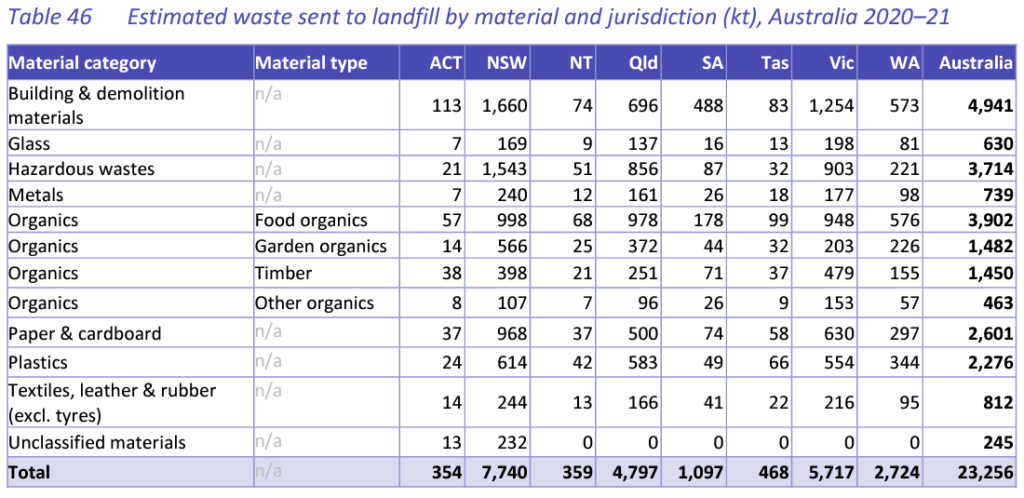
Source: National Waste Report 2022 16 DECEMBER 2022 Updated 10 February 2023, page 142
B. The Environmental Repercussions of Mismanaged Organic Waste
When organic waste is mismanaged, its impact on the environment can be detrimental. Landfills packed with organic waste contribute significantly to greenhouse gas emissions, particularly methane, which is 28 times more potent than carbon dioxide over a 100-year period. These emissions play a substantial role in climate change, affecting weather patterns, and increasing the frequency of extreme weather events.
Beyond greenhouse gases, mismanaged organic waste can lead to other environmental issues. For instance, when organic matter decomposes without proper oxygenation, it can create leachate, a liquid that, if not properly managed, can contaminate soil and waterways, posing risks to wildlife and human health. The presence of organic waste in landfills also attracts pests and can lead to unpleasant odors, impacting the quality of life for nearby communities.
Understanding these repercussions is crucial for professionals in every sector. It underscores the importance of effective FOGO waste management and serves as a reminder of the broader environmental and societal goals at stake.
C. FOGO’s Role in the Circular Economy and Sustainable Practices
Embracing FOGO waste management is not just about mitigating negative impacts; it’s also about unlocking positive potential. FOGO plays a pivotal role in the circular economy, a systemic approach to economic development designed to benefit businesses, society, and the environment. In contrast to the ‘take-make-waste’ linear model, a circular economy aims to redefine growth, focusing on positive society-wide benefits.
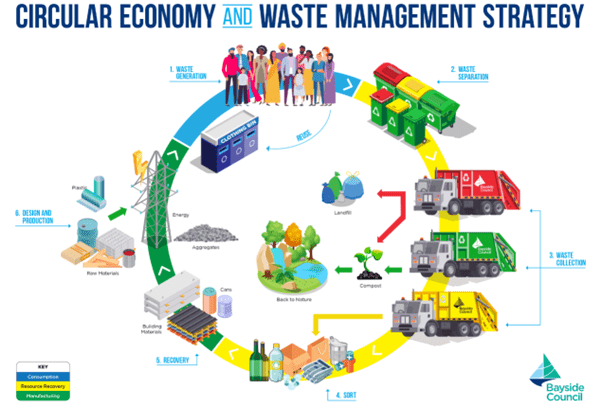
Source: https://www.bayside.nsw.gov.au/services/waste-recycling/circular-economy-waste-management
Properly managed FOGO waste becomes a resource rather than a burden. Through composting and anaerobic digestion, organic waste is transformed into compost and biogas, both valuable products. Compost enriches soil, reducing the need for chemical fertilizers and promoting healthier plant growth. Biogas can be used as a renewable energy source, reducing reliance on fossil fuels. By integrating FOGO waste management into their operations, businesses, cities, and consultancies not only contribute to environmental sustainability but also tap into new economic opportunities, aligning with the principles of a circular economy.
In the next sections, we’ll explore the challenges of organic waste management and introduce the innovative solutions that are changing the landscape of FOGO waste management across sectors.
II. Navigating the Complex Landscape of Organic Waste Management
In the pursuit of sustainability, professionals across various sectors face a multitude of challenges in managing organic waste. These obstacles range from regulatory compliance and logistical issues to the need for education and community engagement. In this section, we will explore these challenges in depth and discuss strategies to overcome them, ensuring that your approach to FOGO waste management is not only effective but also aligns with your broader sustainability goals.
A. Common Challenges in Organic Waste Handling Across Sectors
Organic waste handling presents a unique set of challenges that can vary significantly from one sector to another. Businesses, especially those in the food and hospitality industry, often grapple with the high volumes of organic waste, the need for frequent collection, and the pressure to maintain a clean and odor-free environment. Cities and municipal councils face the daunting task of managing the organic waste of entire communities, requiring robust infrastructure, efficient collection systems, and effective public education programs. Environmental consultancies, on the other hand, need to stay abreast of the latest technologies and regulations, offering their clients cutting-edge solutions that are both practical and compliant.
One common challenge across all sectors is the lack of awareness and education about the benefits of proper organic waste management and the available solutions. This often leads to a reluctance to adopt new practices and technologies, hindering progress towards more sustainable waste management. Additionally, the upfront costs and perceived complexities of implementing new systems can be significant deterrents, especially for small businesses and underfunded municipal programs.
Common challenges:
– ? **Odor Control**: Managing the strong smells that often accompany decomposing organic materials is a significant challenge, requiring specialized ventilation and treatment systems.
– ? **Pest Attraction**: Organic waste can attract rodents and insects, necessitating robust containment and disposal strategies to prevent infestations.
– ? **Regulatory Compliance**: Adhering to local, state, and federal regulations regarding organic waste handling, processing, and disposal can be complex and requires diligent monitoring and reporting.
– ? **Efficient Processing**: Developing efficient processes for converting organic waste into usable products like compost or energy while minimizing resource use is challenging.
– ? **Space Limitations**: Finding adequate space for the composting or storage of organic waste can be difficult, especially in urban areas.
– ? **Leachate Management**: Controlling and treating leachate, the liquid that drains from decomposing waste, is essential to prevent soil and water pollution.
– ? **Scaling Operations**: Scaling organic waste management systems to handle increased volumes without compromising on efficiency or environmental protection is a key challenge.
– ?️ **Infrastructure Investment**: Investing in the necessary infrastructure for organic waste management, such as composting facilities or anaerobic digesters, requires significant capital.
– ?? **Public Engagement**: Encouraging public participation in organic waste separation and educating about the benefits of proper organic waste management are ongoing challenges.
– ? **Corporate Responsibility**: Integrating organic waste management into corporate sustainability goals and practices can be complex but is increasingly expected by consumers and regulators.
B. Regulatory Hurdles and Compliance Issues
Regulatory compliance is a critical aspect of organic waste management, yet it can also be a significant hurdle. Regulations regarding organic waste disposal and processing can vary widely, not just from country to country, but even from city to city. Staying informed about and compliant with these regulations requires a considerable investment of time and resources. Furthermore, the landscape of environmental regulations is constantly evolving, with new standards and requirements emerging as the global understanding of environmental issues deepens.
For businesses, non-compliance can result in hefty fines and damage to reputation. For cities and councils, it can lead to inefficiencies in waste management and missed opportunities to foster a more sustainable community. Environmental consultancies bear the responsibility of ensuring their clients are not only compliant but also positioned to take advantage of any incentives or benefits that regulations might offer.
Australia’s approach to organic waste management is regionally diverse, with national targets set by the National Waste Policy Action Plan (2019) aiming for an 80% resource recovery rate from all waste streams by 2030 and a 10% reduction in waste per person. DCCEEW.
New South Wales (NSW)
- Mandatory FOGO Collection: By 2030 for households and selected businesses.
- Support Programs: Includes the Organics Infrastructure Grant program.
- Compost Connect
South Australia
- Food Waste Strategy: 2020-2025 with a three-bin system.
- Urban Waste Segregation: Goal for all urban communities by 2025.
- Compost Connect
Victoria
- Four-Bin System Transition: Mandatory by 2026-2027.
- FOGO Access: For all Victorians by 2030.
- Compost Connect
Western Australia
- Material Recovery Target: 75% by 2025.
- Bin Collection System: Three-bin system in Perth and Peel regions.
- Compost Connect
- WA Government
Tasmania
- FOGO Bins: Implemented in Hobart since November 2019 for all residents and businesses.
- Compost Connect
Queensland
- FOGO Trial: Conducted from August 2021 to September 2022.
- Investment Plans: $151 million to support organic…
C. Strategies to Overcome These Challenges
While the challenges of FOGO waste management are significant, they are not insurmountable. A strategic approach, combined with a willingness to embrace innovation, can pave the way for success. Here are some strategies to overcome these challenges:
- Educate and Engage: Education is key to changing perceptions and behaviors around organic waste. Businesses can train their staff, cities can engage their communities through public education programs, and consultancies can inform and inspire their clients with the latest success stories and research.
- Invest in Infrastructure: Efficient and effective organic waste management requires the right infrastructure. This might mean investing in better waste collection systems, composting facilities, or biofilter technologies that can reduce the impact of organic waste.
- Stay Informed and Compliant: Keeping up-to-date with the latest regulations and ensuring compliance is crucial. This might require dedicated staff or partnerships with consultancies that specialize in environmental law and policy.
- Embrace Technology: New technologies are constantly emerging that can make organic waste management more efficient and less costly. Staying open to these innovations can provide a significant competitive edge.
- Collaborate for Success: No entity exists in a vacuum. Collaborating with other businesses, government bodies, and educational institutions can lead to shared successes and advancements in organic waste management.
In the next section, we will delve into one such technological innovation—the biofilter lid—and explore how it is transforming the landscape of FOGO waste management across sectors.
III. The Biofilter Lid: A Game-Changer in FOGO Management
In the quest to address the multifaceted challenges of FOGO waste management, the biofilter lid emerges as a standout solution, bridging the gap between sustainability goals and operational efficiency. This innovative technology is not just a tool; it’s a transformation in how businesses, cities, and environmental consultancies approach organic waste. In this section, we’ll uncover the technology behind biofilter lids, explore their impact on FOGO waste management challenges, and discuss the diverse benefits they bring to various sectors.
A. Unveiling the Innovative Technology Behind Biofilter Lids
The biofilter lid is a testament to the power of innovation in waste management. These lids are designed with advanced materials and a unique structure that facilitates the decomposition of organic waste. This process significantly reduces the emission of foul odors and deters pests, addressing two of the most pressing issues in organic waste management. Moreover, the lids are constructed to withstand harsh environmental conditions, ensuring durability and longevity.

fogo bin – organic waste – lid 240 ltr
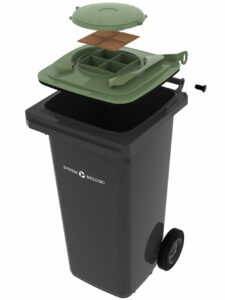
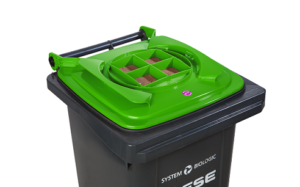
bio-filter lid 120 litres
B. Tackling Sector-Specific FOGO Challenges with Biofilter Lids
The introduction of biofilter lids into the FOGO waste management ecosystem offers a plethora of solutions tailored to sector-specific challenges:
- For Businesses: Especially those in the food and hospitality sector, biofilter lids can transform waste areas from odor hotspots to odor-neutral zones, improving the overall environment for customers and staff alike. The reduction in pest attraction also contributes to a cleaner, more hygienic waste handling area.
- For Cities and Councils: Biofilter lids offer a scalable solution to manage the organic waste of entire communities efficiently. By reducing odors and pests, the lids help in maintaining the cleanliness and livability of urban spaces. Moreover, the biofilter lid increases the acceptance of the organic waste collection.
- For Environmental Consultancies: The biofilter lid technology provides a robust tool in their arsenal to help clients address their waste management challenges effectively. The consultancies can offer this solution as a part of their sustainability strategies, ensuring their clients are not just compliant with regulations but are also leaders in environmental stewardship.
C. The Multifaceted Benefits of Biofilter Lids in Diverse Settings
The adoption of biofilter lids goes beyond solving immediate waste management issues. It brings a range of benefits that resonate with the overarching goals of sustainability and operational efficiency:
- Environmental Impact: By promoting decomposition of organic waste, biofilter lids contribute to the reduction of methane emissions from landfills, aligning with global efforts to combat climate change.
- Cost Savings: The efficient management of organic waste can lead to significant savings in waste collection and disposal costs. Additionally, the reduction in pest-related issues can lower maintenance and cleaning expenses.
- Compliance and Reputation: Implementing innovative solutions like biofilter lids can help businesses and cities in staying compliant with ever-tightening environmental regulations. It also enhances their reputation as pioneers in sustainability, attracting customers, residents, and partnerships.
In conclusion, the biofilter lid is more than just a product; it’s a pathway to transforming FOGO waste management across sectors. Its innovative design, coupled with its profound environmental and operational benefits, makes it a quintessential element in the quest for sustainability. As we continue to navigate the complexities of waste management, technologies like the biofilter lid shine as beacons of progress and potential.
IV. Practical Implementation of Biofilter Lids
Understanding the transformative potential of biofilter lids in FOGO waste management is just the beginning. The true test lies in their implementation and integration into existing waste management systems. In this section, we’ll guide you through a step-by-step approach to adopting biofilter lid technology, ensuring that the transition is smooth, effective, and aligned with your operational goals.
A. Evaluating and Adapting to Existing Waste Management Systems
The first step in implementing biofilter lids is to conduct a thorough evaluation of your current waste management practices. This assessment should consider the volume and type of organic waste generated, the existing collection and disposal processes, and the infrastructure in place. Understanding these elements will help in identifying the specific needs and challenges your system might face when integrating biofilter lids.
Adaptation is key. The goal is to integrate biofilter lids in a way that complements and enhances your current system. This might involve identifying collection containers to fit the lids, adjusting waste collection schedules to maximize the efficiency of the lids, or even retraining staff to handle the new system effectively.
B. Seamless Integration Tips for Every Sector
Integration of new technology should be as seamless as possible to minimize disruption and ensure quick adoption. Here are some tips for a smooth integration of biofilter lids into your waste management system:
- Engage with Stakeholders: Involving everyone, from staff to waste management contractors, in the integration process ensures that the system works for everyone. Open communication can also provide valuable feedback that can be used to fine-tune the system.
- Start Small: If possible, consider a pilot program to test the biofilter lids in a controlled section of your operation. This approach allows you to identify and address any issues before a full-scale rollout.
- Utilize Training and Support: Make full use of any training and support offered by the biofilter lid supplier. Proper training ensures that your staff understands how to use and maintain the lids effectively, ensuring long-term success.
C. Training, Maintenance, and Sustained Success
Once the biofilter lids are integrated into your system, the focus shifts to training, maintenance, and ensuring the long-term success of your new waste management solution. Here’s how you can ensure that your investment in biofilter lid technology continues to pay off:
- Comprehensive Training: Invest in comprehensive training programs for your staff. Ensure they understand how the biofilter lids work, the benefits they bring, and their role in maintaining the system.
- Regular Filter Material Replacement: Establish a regular filter material replacement schedule for the biofilter lids to ensure optimal performance.
Implementing biofilter lids in your waste management system is not just about installing a new product; it’s about embracing a new approach to sustainability. By following these steps, you can ensure that your transition to biofilter lid technology is successful, setting your business, city, or consultancy up for a greener, more efficient future.
V. Success in Action: Sector-Specific Case Studies
The theoretical benefits of biofilter lids are compelling, but nothing speaks louder than real-world success. In this section, we’ll explore a series of case studies from various sectors — businesses, cities, and environmental consultancies — that have successfully implemented biofilter lid technology. These stories not only demonstrate the tangible benefits of the lids but also provide insights into the practicalities of their integration and the positive impact they have on FOGO waste management.
A. Transformations in Waste Management within the Corporate Sector
In the corporate sector, particularly within the hospitality industry, the implementation of biofilter lids has led to significant operational improvements. A prominent shopping center chain, for instance, adopted the lids. The results were immediate: a drastic reduction in odors in waste disposal areas, leading to an enhanced visitor experience. Furthermore, the reduction in pest infestations led to lower maintenance costs and improved hygiene standards. A notable decrease in the frequency of waste collections is possible, thanks to the lids’ efficiency in waste volume reduction, leading to substantial cost savings and a smaller carbon footprint.
B. Municipal Success Stories: Cities and Councils Setting Benchmarks
For cities and municipal councils, the introduction of biofilter lids has been a game-changer in community waste management. One city council, after integrating the lids into its public waste system, witnessed a significant improvement in urban cleanliness and public satisfaction. The success of the program has set a benchmark for other councils, showcasing the potential of innovative solutions in addressing urban waste management challenges.
C. Consultancies Elevating Client Services with Cutting-Edge Solutions
Environmental consultancies play a crucial role in guiding businesses and municipalities towards sustainable practices. One consultancy, specializing in waste management solutions, introduced biofilter lids as part of its service offerings. The move not only enhanced its reputation as a forward-thinking provider but also allowed its clients to reap the benefits of the technology. Businesses and councils that followed the consultancy’s recommendations reported similar benefits: reduced odors and pests, cost savings, and operational efficiencies. The consultancy’s success in implementing the biofilter lid technology has solidified its position as a leader in sustainable waste management solutions.
These case studies serve as a testament to the versatility and effectiveness of biofilter lids in various settings. They demonstrate that regardless of the sector, the adoption of innovative technologies like biofilter lids can lead to significant environmental, operational, and economic benefits. As we continue to navigate the complexities of waste management, these success stories offer inspiration and guidance, showing us the way to a more sustainable future.
VI. Trial and Success: Embracing the Biofilter Lid Technology
Embarking on a journey with a new technology can be both exciting and daunting. The decision to integrate biofilter lids into your waste management system is a significant step towards sustainability and operational efficiency. In this section, we’ll guide you through the process of initiating a trial with biofilter lid technology, setting realistic expectations, and ensuring that your trial period is structured for success.
A. Initiating and Optimizing Your Trial Experience
The trial phase is a critical time to understand how biofilter lids can be best utilized within your specific context. To initiate the trial, it’s essential to partner with a provider that understands your sector’s unique challenges and can offer comprehensive support throughout the process. Begin by defining clear objectives for the trial — whether it’s reducing odors, decreasing waste volume, or improving operational efficiency. Once the trial is underway, maintain open communication with your provider to address any issues and optimize the use of the lids.
For optimal results, consider these steps:
- Site Selection: Choose a trial site that is representative of the conditions and challenges your operation typically faces.
- Staff Engagement: Ensure that your team is fully engaged and informed about the trial objectives and how the biofilter lids function.
- Data Collection: Survey the users of the biofilter lids at regular intervals to monitor performance and gain insights.
B. Tracking Success: Metrics that Matter for Each Sector
Measuring the success of your trial is about more than just checking whether the lids fit onto your bins. It’s about understanding the impact they have on your waste management practices and the broader objectives of your organization. Establish key performance indicators (KPIs) relevant to your sector, whether it’s a reduction in waste management costs, improvements in community satisfaction ratings, or a decrease in the frequency of waste collection services. Regularly review these metrics throughout the trial to assess the performance of the lids and identify areas for improvement.
C. Iterative Feedback: Fine-Tuning for Excellence
A trial is not just a test; it’s an opportunity to learn and improve. Treat the trial period as a collaborative effort between your organization and the biofilter lid provider. Provide regular feedback based on your observations and the data collected. Be open to making adjustments to your waste management practices based on the insights gained during the trial. This iterative process of feedback and fine-tuning is crucial for ensuring that the integration of biofilter lids into your system is as effective and beneficial as possible.
In conclusion, a trial with biofilter lid technology offers a unique opportunity to pave the way for a more sustainable and efficient future in waste management. By approaching the trial with clear objectives, a commitment to monitoring and improvement, and a spirit of collaboration, you can ensure that your organization reaps the full benefits of this innovative solution.
VII. Looking Ahead: The Evolution of FOGO Waste Management
The landscape of waste management is constantly evolving, driven by technological advancements, regulatory changes, and a growing emphasis on sustainability. As we look to the future, it’s clear that FOGO waste management will continue to play a pivotal role in our journey towards a more sustainable and efficient society. In this final section, we’ll explore the trends and developments that are shaping the future of FOGO waste management, and how organizations can stay ahead in this dynamic environment.
A. Anticipating Technological Breakthroughs
The field of waste management technology is ripe with innovation. From advances in organic waste collection to the integration of AI and machine learning for smarter waste tracking and management, the potential for change is huge. Companies that stay on top of these technological trends and are willing to adopt new solutions will find themselves at the forefront of the industry. The use of innovation not only improves waste management practices, but also positions companies as leaders in environmental protection and operational efficiency.
B. Regulatory Trends: Staying Ahead of the Curve
As global awareness of environmental issues continues to grow, regulations around waste management are becoming increasingly stringent. Organizations must be proactive in understanding and complying with these regulations to avoid penalties and reputational damage. More importantly, staying ahead of regulatory trends can provide opportunities for innovation and leadership. By anticipating changes and adapting swiftly, organizations can turn regulatory compliance into a competitive advantage, setting new standards in sustainable waste management.
C. Community and Stakeholder Engagement as a Pillar of Success
The success of waste management initiatives often hinges on the support and participation of the community and stakeholders. As FOGO waste management practices evolve, engaging with these groups becomes even more crucial. Effective communication, education, and involvement strategies can foster a culture of sustainability, driving collective action towards shared goals. Organizations that invest in building strong relationships with their communities and stakeholders will not only enhance their waste management outcomes but also strengthen their social license to operate.
In conclusion, the journey of FOGO waste management is one of continuous learning and adaptation. The future promises exciting opportunities for those willing to embrace change and lead the way in sustainability. By staying informed about technological advancements, regulatory trends, and the importance of community engagement, organizations can navigate the evolving landscape of waste management with confidence and purpose, paving the way for a cleaner, greener, and more sustainable future.
Conclusion: Paving the Way for a Sustainable Future
As we wrap up this comprehensive journey through the world of FOGO (Food Organics and Garden Organics) waste management, it’s clear that the path to sustainability is both challenging and rewarding. From understanding the basics of FOGO waste to exploring the cutting-edge biofilter lid technology, we’ve delved into the multifaceted aspects of modern waste management practices. We’ve seen how businesses, cities, and consultancies alike can overcome the hurdles of organic waste management and how they can reap the myriad benefits of embracing innovative solutions.
The integration of biofilter lids into your waste management system signifies more than just an operational upgrade. It represents a commitment to environmental stewardship, a step towards operational excellence, and a contribution to the broader goal of a sustainable future. The case studies we’ve explored provide real-world evidence of the transformative potential of biofilter lids, showcasing their impact across various sectors. The trial phase, with its focus on preparation, measurement, and feedback, offers a structured approach to adopting this technology, ensuring that your organization is well-positioned to maximize its benefits.
Looking ahead, the evolving landscape of FOGO waste management presents both challenges and opportunities. Staying informed about technological advancements, regulatory trends, and the importance of community engagement will be key to navigating this landscape successfully. By embracing change, seeking innovation, and fostering a culture of sustainability, organizations can not only enhance their waste management practices but also contribute to a healthier planet and a more sustainable society.
In conclusion, mastering FOGO waste management is an ongoing journey of adaptation and improvement. It’s about making informed choices, embracing innovative solutions like biofilter lids, and working collectively towards a sustainable future. As we continue to push the boundaries of what’s possible in waste management, let’s remember that every step we take, no matter how small, is a step towards a cleaner, greener, and more sustainable world.
Join the Sustainability Revolution
Now that you’ve journeyed through the comprehensive world of FOGO waste management and discovered the transformative power of biofilter lid technology, the next step is clear. It’s time to take action and be part of the sustainability revolution. Whether you are a business leader, a city planner, or an environmental consultant, the opportunity to make a significant impact is right at your fingertips.
Start Your Trial Today: Don’t just read about change; be the change. Begin your trial with the biofilter lid technology and witness firsthand the difference it can make in your waste management system. Experience the benefits of reduced odors, lower costs, and improved sustainability in your operations.
Engage with Experts: If you have questions or need guidance, our team of experts is here to help. We are committed to supporting you throughout your journey, from initial consultation to full-scale implementation. Contact us to explore how our solutions can be tailored to meet your unique needs and objectives.
Stay Informed: The world of waste management is always evolving. Stay ahead of the curve by subscribing to our newsletter, following us on social media, or regularly visiting our blog. We provide ongoing insights, updates, and success stories to keep you informed and inspired.
Spread the Word: Share your commitment to sustainability with your network. Let others know about the potential of biofilter lid technology and how it can transform the way we manage organic waste. Together, we can amplify the impact and drive a collective movement towards a more sustainable future.
Remember, every step towards sustainability, no matter how small, counts in the grand scheme of environmental stewardship. By choosing to embrace innovative solutions like biofilter lids, you are not just optimizing your waste management practices; you are contributing to a healthier planet and a brighter future for generations to come.
Join us in this sustainability revolution. Contact Smart Biz today to start your journey towards a more efficient and eco-friendly waste management system.

